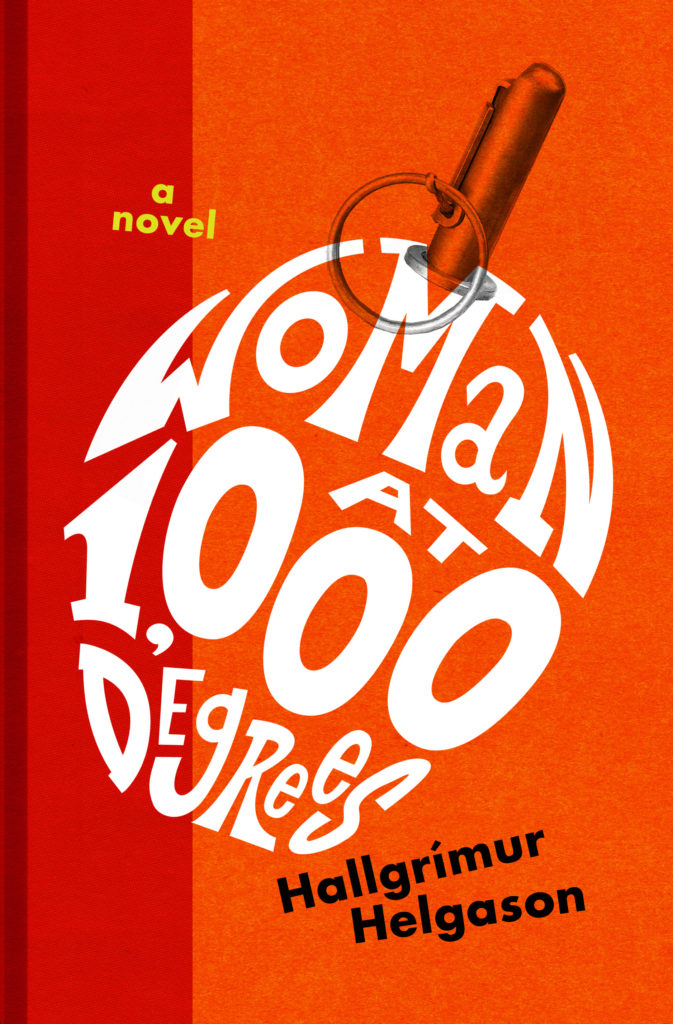Welcome to our #FridayReads feature on the blog, where we’ll be excerpting a chapter of one of our favorite books to start your weekend. This week, it’s Hallgrímur Helgason’s Woman at 1,000 Degrees, the international bestseller—originally published in Icelandic—told in the voice of eighty-year-old Herra Bjornsson, as she reflects on the mishaps, tragedies, and turns of luck that took her from Iceland to Nazi Germany, from the United States to Argentina and back to a post-crash, high-tech, modern Iceland.
Scroll down for an excerpt.

Woman at 1,000 Degrees
I live here alone in a garage, together with a laptop computer and an old hand grenade. It’s pretty cozy. My bed is a hospital bed and I don’t need any other furniture except for the toilet, which is a real drag to use. It’s such a long way to travel, all along the bed and then the same distance again over to the corner. I call it my Via Dolorosa and I have to totter across it three times a day, like any other rheumatic ghost. My dream is to be hooked up to a catheter and a bedpan, but my application got stuck in the system. There’s constipation everywhere.
There aren’t many windows here, but the world appears to me through my computer screen. E-mails come and go, and good old Facebook just keeps on going, like life itself. Glaciers melt, presidents darken, and people lament the loss of cars and houses. But the future awaits at the end of the baggage claim carousel, slant eyed and smirking. Oh yes, I follow it all from my old white bed, where I languish like a useless corpse, waiting to die or to be given a life-prolonging injection. They look in on me twice a day, the girls from the Reykjavík Home Care Services. The morning shift is a real darling, but the afternoon hag has cold hands and bad breath and empties the ashtray with a vacant air.
But if I shut my eye to the world, switch off the lamp above me, and allow the autumn darkness to fill the garage, I can make out the famous Imagine Peace Tower through a narrow window high up on the wall. Because the late John Lennon has now been turned into a pillar of light up here in Iceland, lighting up the black strait on long nights. His widow was kind enough to place him vertically in my line of vision. Yes, it’s good to doze off to an old flame.
Of course, you could say I’m just vegetating in this garage like any other old vintage clunker that has run its course. I mentioned this to Gudjón one day. He and Dóra are the couple who rent me the garage at 65,000 kronur a month. Good Gudjón laughed and declared I was an Oldsmobile. I surfed the net and found a photo of an Oldsmobile Viking, 1929 model. To be honest, I hadn’t realized I’d grown so darn old. It looked like a slightly revamped horse carriage.
I’ve been lying alone in this garage for eight years now, bedridden because of the emphysema that’s plagued me for three times that long. The slightest movement cuts my breath away until I’m on the point of choking—not a pleasant feeling, the discomfort of the unburied, they used to call it in the old days. The result of decades of smoking. I’ve been sucking on cigarettes since the spring of 1945, when a warty Swede first introduced me to these wonders. And their glow still makes me glow. They offered me a mask with nasal tubes that was supposed to make it easier for me to breathe, but to get the oxygen cylinder they told me I’d have to give up smoking “because of the fire hazard.” So I was forced to choose between two gentlemen: Nicotine, the Russian Count, and Oxygen, the British Lord. It was an easy choice. Consequently, I draw my breath like a steam engine, and my voyages to the toilet remain my daily penance. But little Lóa likes going in there and I enjoy the tinkling music of her maiden’s piddle. She’s my help.
Oh, I’m rambling. When you’ve lived through a whole Internet of events, a whole shipload of days, it’s hard to distinguish one thing from another. It all flows into one big muddle of time. Either I suddenly remember everything at once or I remember nothing at all.
Oh yeah, and then our nation collapsed, been a year now. But it’s all relative, of course. Dóra and the nurses assure me that the city is still standing. There are no visible signs of the crash in Reykjavík, unlike in Berlin when I roamed through it as a silly young lass, after its fall at the end of the war. And I don’t know which is better—an overt crash or a covert one.
Personally, I reveled in the crash. Throughout the boom years I’d lain bedridden while the greed around me was devouring all my savings, so it didn’t upset me to see them disappear into the bonfire, since by then I’d developed a slight indifference to money. We spend our entire lives trying to put something away for old age, but then old age arrives with no dreams of luxury beyond the ambition of being able to pee lying down. I won’t deny that it would have been nice to shop around for some German boy toy and have him stand here, half-naked in the candlelight, declaiming Schiller to his old pillow hag, but apparently they’ve banned the flesh trade in our country now, so there’s no point in bemoaning that. I’ve nothing left except a few weeks of life, two cartons of Pall Malls, a laptop, and a hand grenade, and I’ve never felt better.
The hand grenade is an old Hitler’s egg that I acquired in the last war. It’s accompanied me over the rivers and fjords of my life, through all my marriages, thick and thin. And now, at last, would be the time to use it, had not the seal broken off many years ago, on a bad day in my life. But it’s an uncomfortable way to die, of course, to embrace a firestorm like that and allow it to blow your head off. And to tell the truth, I’ve grown quite fond of my blessed little bomb after all these years. It would be sad if my grandchildren weren’t able to enjoy it, in a silver bowl inside an heirloom cabinet.
Meine geliebte Handgranate is beautiful in its deceit, fits nicely in one’s hand, and cools a sweaty palm with its cold iron shell crammed with peace. That’s the really remarkable thing about weapons: although they can be unpleasant for those who get in their way, they provide their holders with a great deal of comfort. Once, many cities ago, I left my golden egg in a cab and couldn’t put my mind to rest until I’d recovered it again, after countless frantic calls to the cab station. The cabby hovered awkwardly on the stairs, trying to figure it out.
“That’s an old hand grenade, isn’t it?”
“No, it’s a piece of jewelry. Have you never heard of the Imperial Fabergé eggs?”
At any rate, for a long time I kept it in my jewelry box.
“What’s that?” my charming sea bear Bæring once asked me, as we were about to set off for a ball.
“It’s a perfume, Feu de Cologne.”
“Really?” the old sailor gasped in astonishment.
Men have their uses, but quick witted they sure ain’t.
And it never hurt to know that the hand grenade was there in my handbag when the night was over and some jerk wanted to take me home.
Now I keep it either in my bedside table or between my rotting legs, lying on the German steel egg like some postwar hen, in the hope of hatching some fire—something that is so sorely missed in this dreary thing that society has become, totally devoid of violence. It can do people only good to lose the roof over their head or see their loved ones shot in the back. I’ve always had problems with people who’ve never had to clamber over dead bodies.
But maybe if I throw it on the floor it’ll go off? Hand grenades love stone floors, I once heard. Yes, of course, it would be wonderful to exit with a bang and leave them to pick through the dust and debris in the hope of finding some morsels of my flesh. But before I explode, permit me to review my life.
Hooked? You can buy the book here.
Amazon | B&N | Indiebound | Workman





No Comments